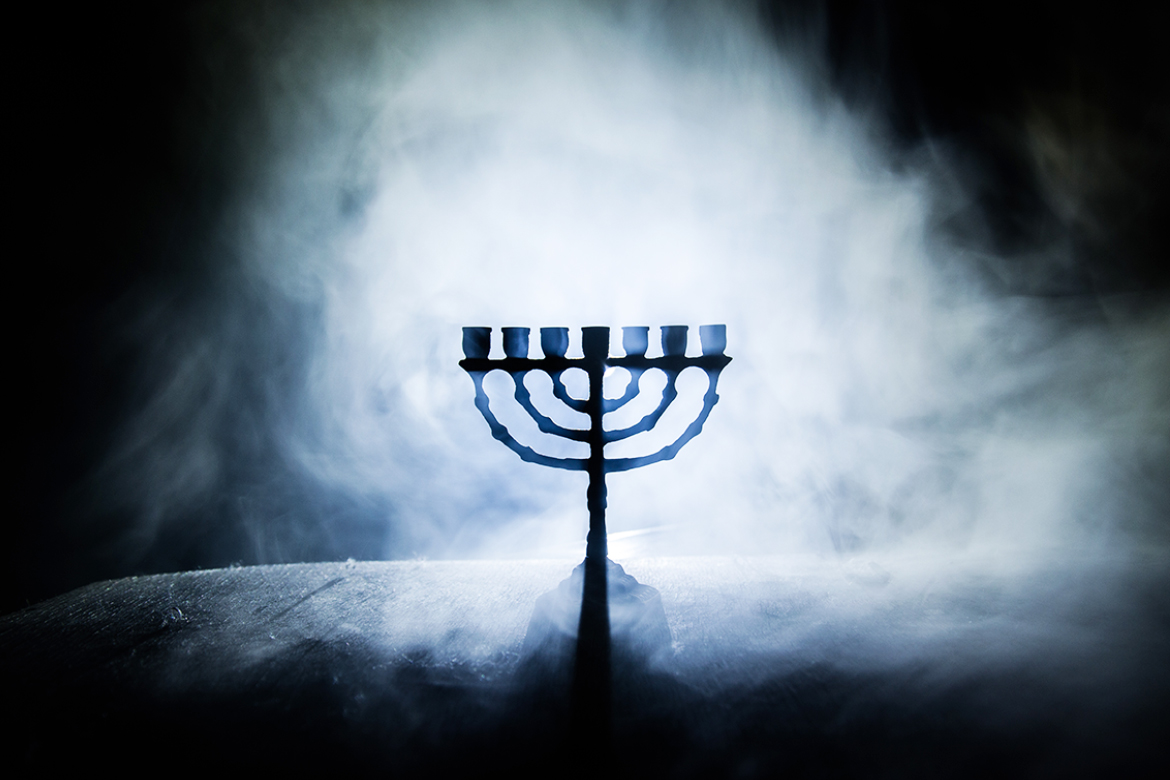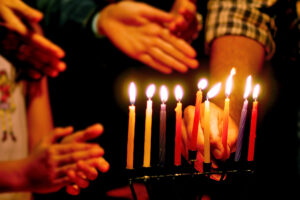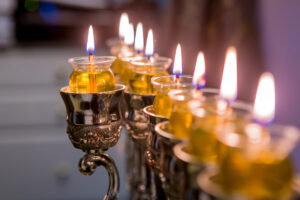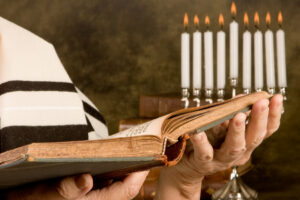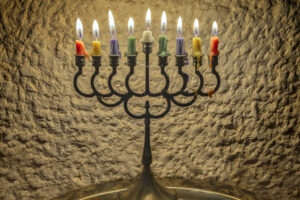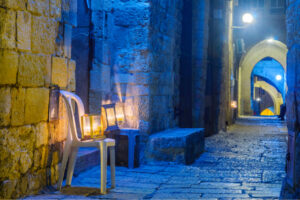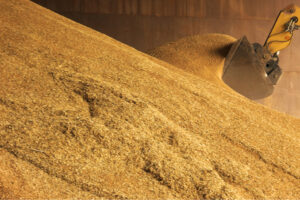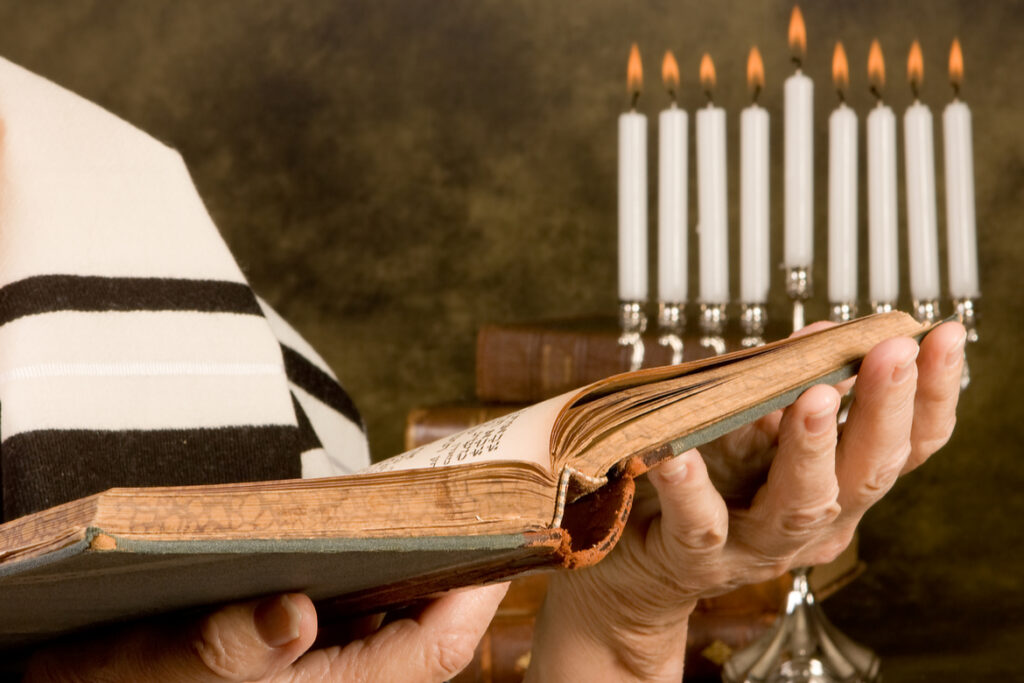Black Light
One of the first things a person learns when he discovers Rebbe Nachman is the Rebbe’s penchant for accentuating the positive!
When and where Rebbe Nachman told this parable is not recorded. But he told it and since Chanukah is not too far away, we share it now:
A ma’aseh (story, parable).
A son left his father. He was in many lands for a long time, staying with strangers. After a while he returned to his father. The son was proud that he had learned there an important craft: how to make heng-leichter, hanging candelabras or menorahs. He insisted that his father invite all those engaged in menorahmaking in order to display his expertise in the craft. The father complied. He invited all the menorah artisans to see his son’s success, what he had achieved during his time away with strangers.
The son displayed a menorah that he had made. Everyone thought it was very ugly. The father mingled among the craftsmen, asking them for their honest appraisal. They had no choice but to tell him the truth: it was quite ugly
The son bragged to his father, “Did you see the genius of my craft?” The father broke the news to him: nobody thought it was nice. “On the contrary!” answered the son. “That’s exactly how I demonstrated my expertise. I showed everyone his flaw. This menorah has the flaws of each of the local craftsmen. You can see it for yourself.
“This one thought that one piece was ugly, but that another piece was stunning. For the second craftsman, it was just the opposite. What the first one thought was ugly, he thought was beautiful, exquisite—but a different part was atrocious. This was true for all of them: what one thought was repulsive, the other considered attractive, and vice versa.
“I made this menorah solely from flaws in order to show all of them that they aren’t perfect, that no one is perfect. Because what one thinks is beautiful, someone else considers a flaw. But in fact, I can make [a menorah] the way it ought to be.”
Rebbe Nachman then commented, “If people would know the flaws and deficiencies of an object, they would know its essence, even if they had never actually seen the object.”
One of the first things a person learns when he discovers Rebbe Nachman is the Rebbe’s penchant for accentuating the positive. In particular, the lesson Azamra (Likutey Moharan I, 282) teaches us to find the good points—at least one— in ourselves and in others. So this ma’aseh (untitled in the original, but often called “The Chandelier” or “The Menorah”) seems out of character. There are many details in this ma’aseh, but let’s focus on what the son was trying to accomplish.*
What was the son trying to do? Was he trying to show off? Make his father proud? Put the local (read: provincial) artisans to shame? All of the above? He tells his father he wants the menorahmakers to realize that they have shortcomings. Yet he never tells them. He tells us. So it is we, the readers, that Rebbe Nachman is inviting to view the menorah. This is the first good point the Rebbe is finding within us, namely that we—like he—are menorah-makers, meant to shine a unique light into the world.

The invitation to view the son’s craftsmanship is reminiscent of the competitions in Rebbe Nachman’s story “The Seven Beggars.” Just as in that story, in which the crippled, seemingly powerless beggars are really the most skilled and accomplished, here the maker of the universally ugly menorah is able to make the perfect menorah. By its maker’s own admission, the menorah is intentionally made solely of flaws and deficiencies. That is, it was no mistake to make it from mistakes (a type of perfection in a funny kind of way). Yet, ugly as he thought the menorah was, each craftsman also found something to like about it.
So if they thought that parts of the menorah were beautiful, why did the craftsmen say it was ugly? We do it all the time. It’s called “human nature.” Our own imperfect menorahs are pretty good, despite the deficiencies. However, a flaw in someone else’s menorah makes the whole thing ugly—even though it’s the same flaw as ours! But, says the tzaddik, beauty is in the eye of the beholder. We have to learn to see our own ugly, not someone else’s. The fact that the Rebbe pointed out to us this fault means we can rid ourselves of it. That’s another positive in our favor
Finally, remember that even if the menorah you make is totally and absolutely ugly, the light it gives is nonetheless radiant.
* This is only one possible interpretation of this parable.
(Based on Sipurei Ma’asiot (Rabbi Nachman’s Stories), “Additional Stories”)
- 0 comment


